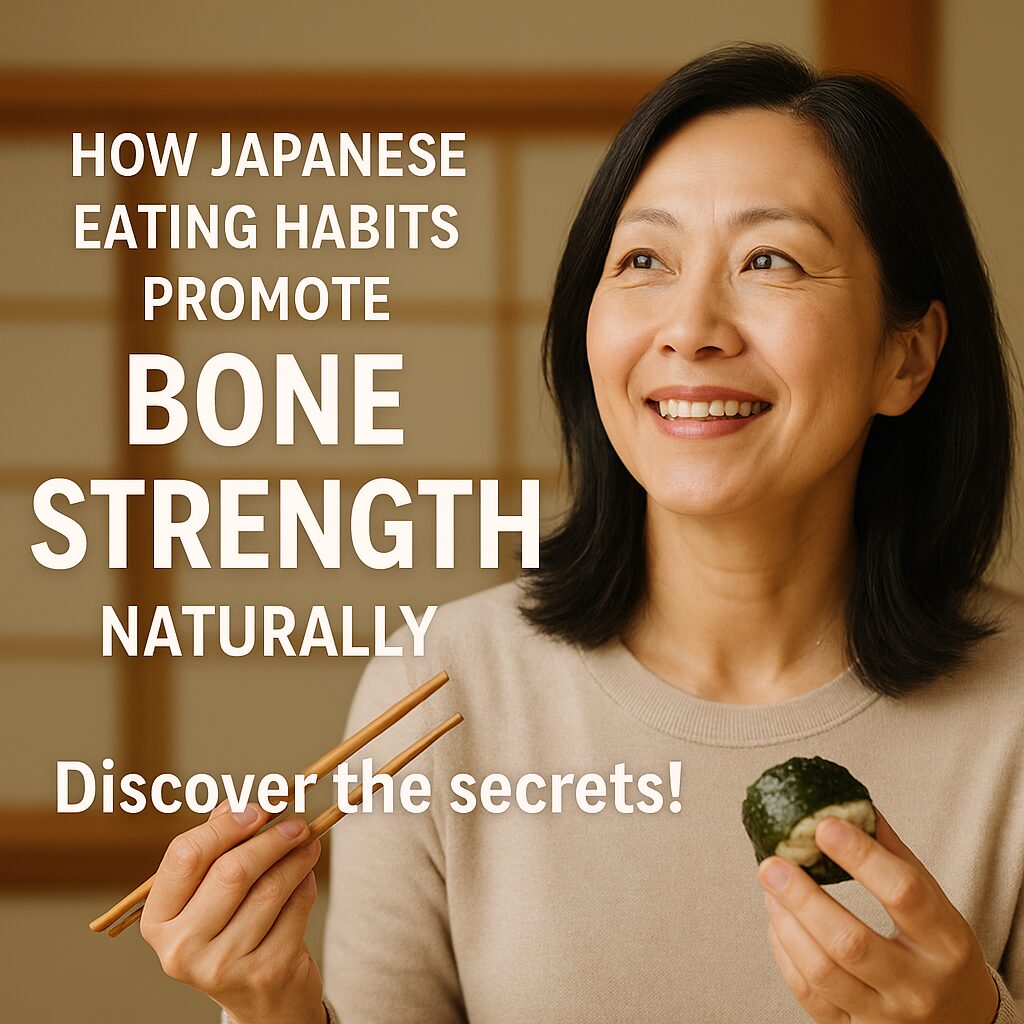Bone health becomes more critical with age, especially for women after menopause. While calcium supplements are popular, natural eating habits offer powerful, lasting support. The traditional Japanese diet, with its balance of minerals, fermented foods, and plant-based nutrients, provides a model for maintaining strong bones naturally.
The Link Between Diet and Bone Health: Why It Matters
Healthy bones require more than just calcium. Magnesium, vitamin K2, protein, and anti-inflammatory nutrients all play vital roles.
A diet rich in these elements helps preserve bone density and prevent fractures.
In Japan, osteoporosis rates among older adults are lower than in many Western countries. Researchers attribute this partly to dietary habits rather than genetics. A study published in Osteoporosis International (source) highlights how traditional Japanese foods contribute to bone health.
By understanding these eating habits, you can make simple, lasting changes to your diet.
Key Japanese Foods That Support Stronger Bones
Small Fish Eaten Whole
Foods like sardines and shishamo (capelin) are often eaten whole, including bones. This provides natural sources of calcium and phosphorus.
Unlike calcium tablets, nutrients from whole foods are easier for the body to absorb. A small serving of grilled sardines can deliver over 300 mg of calcium.
Calcium-Rich Sea Vegetables
Seaweeds like hijiki and wakame are staples in Japanese cuisine. Hijiki, in particular, offers significant amounts of calcium along with magnesium and iron.
These vegetables not only strengthen bones but also support overall mineral balance, which is crucial for bone metabolism.
Tofu and Soy Products
Tofu, miso, and natto supply plant-based protein and isoflavones, which mimic estrogen’s bone-protective effects. This is especially important for postmenopausal women.
A traditional Japanese breakfast often includes small servings of these foods, naturally integrating bone-supportive nutrients into daily life.
The Role of Fermented Foods Like Miso and Natto in Bone Strength
Natural Sources of Vitamin K2
Natto, a fermented soybean dish, stands out as one of the richest natural sources of vitamin K2. Vitamin K2 directs calcium to the bones rather than arteries, improving bone density and heart health.
One study from The Journal of Nutrition (source) suggests regular natto consumption may significantly lower the risk of osteoporosis.
Gut Health and Nutrient Absorption
Fermented foods like miso and pickled vegetables promote healthy gut bacteria. A healthier gut improves nutrient absorption, ensuring that minerals like calcium and magnesium reach the bones efficiently.
By incorporating fermented foods, the Japanese diet supports not only nutrient intake but also nutrient utilization.
How Traditional Japanese Meals Balance Calcium and Magnesium Naturally
Importance of Mineral Balance
Calcium alone cannot strengthen bones. Magnesium helps the body absorb calcium effectively and plays a key role in bone structure.
Japanese meals typically combine ingredients that offer both minerals. For example, a miso soup with tofu (calcium) and wakame (magnesium) provides a perfect balance.
Low-Acid, High-Alkaline Foods
The traditional Japanese diet is rich in alkaline foods like vegetables and seaweed. An alkaline diet reduces calcium loss from bones caused by high-acid Western diets heavy in processed foods and meat.
By keeping the body’s pH in balance, these habits naturally protect bone density.
Simple Ways to Incorporate Japanese Eating Habits Into Your Daily Life
Start with Small Changes
You don’t need to overhaul your entire diet. Begin by adding a cup of miso soup to your lunch or eating a small portion of natto or tofu a few times a week.
Replacing processed snacks with seaweed chips or edamame can also boost mineral intake easily.
Explore Japanese Cooking
Learning simple Japanese recipes like miso soup, simmered hijiki, or grilled fish opens new ways to enjoy bone-strengthening meals.
Websites like Just One Cookbook (link) offer easy, authentic recipes tailored for beginners.
Choose Fermented Options
Next time you shop, consider choosing fermented products such as miso, natto, or even Japanese pickles. These items support both bone health and overall digestion.
Look for organic or traditionally fermented varieties to maximize health benefits.
Conclusion
Traditional Japanese eating habits offer a natural, sustainable way to strengthen bones and protect long-term health. By incorporating even a few of these practices, you can build a diet that supports not just your bones, but your entire well-being.
Supporting Your Bone Health Further
While traditional Japanese foods provide a strong foundation for bone health, modern supplements can offer additional support, especially for busy lifestyles.
Juveriente’s Bone Strength Complex complements these natural habits by combining key nutrients like calcium, magnesium, and fermented Japanese mandarin extract, rich in beta-cryptoxanthin — a powerful compound linked to bone density support.
If you’re looking for an easy way to reinforce your efforts, Bone Strength Complex is a natural choice to help maintain strong, healthy bones as you age.








